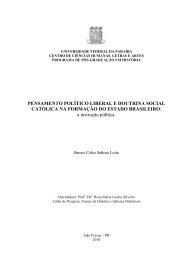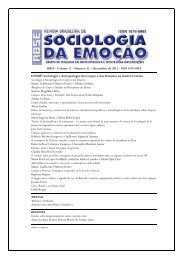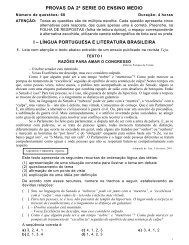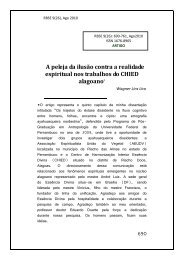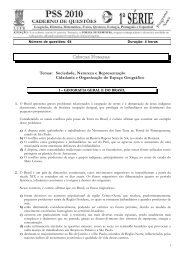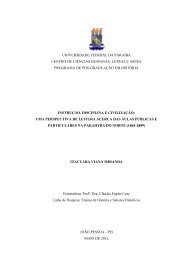abril de 2004 - CCHLA - Universidade Federal da ParaÃba
abril de 2004 - CCHLA - Universidade Federal da ParaÃba
abril de 2004 - CCHLA - Universidade Federal da ParaÃba
You also want an ePaper? Increase the reach of your titles
YUMPU automatically turns print PDFs into web optimized ePapers that Google loves.
Generated by Foxit PDF Creator © Foxit Softwarehttp://www.foxitsoftware.com For evaluation only.to insult and rejection, for example, are often hid<strong>de</strong>n byanger or completely suppressed. Men, particularly,frequently feel either angry, on the one hand, or blank,empty, or hollow, on the other, instead of experiencingshame. Nor is there room for what has been calleddiscretion shame (a sense of shame; see the comment onmo<strong>de</strong>sty, below).Most popular and expert writing on shame uses thevernacular meaning without discussion. John Bradshaw’s(1988) bestseller, Healing the Shame that Binds You,explicitly endorses it. According Bradshaw, all shame is"toxic," a poison. Most self-help books in psychologyassume the same.The meaning of shame in orthodox psychoanalysisis similar. Freud took the stance that guilt is theappropriate emotion for male adults, reserving shame forchildren, women, and natives in traditional societies.Although by no means a follower of Freud, June Tangney,the leading shame researcher in psychology, takesposition parallel to Freud’s. She sees guilt positively, andshame as merely painful. (For a complete review of herframework and her extensive research on shame, seeTangney and Dearing 2002).But languages other than English, to varying<strong>de</strong>grees, <strong>de</strong>fine shame more broadly. They inclu<strong>de</strong> anevery<strong>da</strong>y shame, such as "pu<strong>de</strong>ur" in French (mo<strong>de</strong>sty),and in many languages, the emotion of embarrassment.For this latter reason it is not surprising that severalexperiments in social psychology have shown thatEnglish-speaking subjects consi<strong>de</strong>r embarrassment andshame to be separate emotions. The mistake is that theseresearchers conclu<strong>de</strong>d that they ARE separate emotions,because they had not done the same study with speakersof French, or other languages [3] .The vast differences in the size of the class namesfor love and shame between English and other languagessuggest a conjecture about mo<strong>de</strong>rnization and culture. Itis possible that since England has had the longestexperience with industrialization and urbanization,alienation is most advanced in Anglophone countries likeEngland and the US. If this is the case, the broadness ofthe class name for love, and the narrowness of thevernacular class name for shame, serve to disguise120



